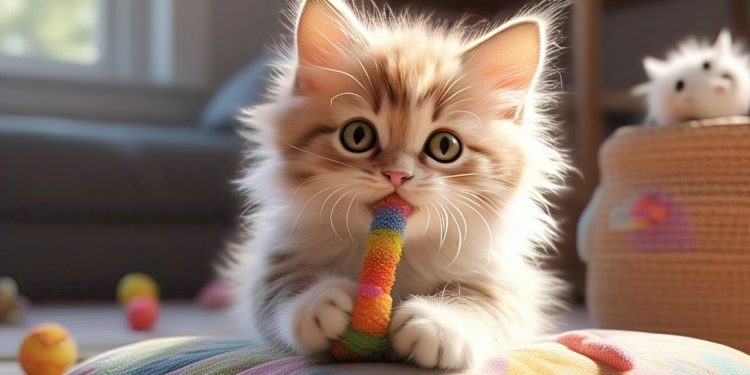Introduction
Just like human babies, cats have baby teeth that eventually fall out as they grow. If you’ve ever found tiny, sharp teeth around your home or noticed your kitten chewing on everything in sight, chances are they’re going through the teething stage. Understanding the kitten teething age and how to support your furry friend during this process is crucial for their comfort and dental health.
This guide provides a comprehensive breakdown of kitten teething, including when it happens, what signs to watch for, and how to help a teething kitten through this natural but sometimes uncomfortable stage.
Do Cats Have Baby Teeth?
Yes! Just like humans, cats have baby teeth, also known as deciduous teeth. These temporary teeth emerge early in a kitten’s life and are eventually replaced by permanent adult teeth.
Kittens have 26 baby teeth, which start coming in at around 2 to 3 weeks old. As they grow, these teeth will fall out and be replaced by 30 adult teeth.
When Do Kittens Start Teething?
The kitten teething age begins at around 2 to 3 weeks old, when their baby teeth first appear. However, most noticeable teething behaviors start when their baby teeth begin falling out, usually between 3 and 6 months of age.
Kitten Teething Timeline
1. Baby Teeth Eruption (2-6 Weeks Old)
- At 2-3 weeks old, the first baby teeth (incisors) start emerging.
- By 6 weeks old, kittens have a full set of 26 baby teeth.
- At this stage, kittens can start eating soft solid foods.
2. Baby Teeth Falling Out (3-6 Months Old)
- 3-4 months old: Baby teeth begin falling out as adult teeth push through.
- 4-6 months old: The teething process becomes more noticeable, with behaviors like excessive chewing, drooling, and mild gum irritation.
- By 6-7 months old, all baby teeth should be gone, replaced by 30 permanent teeth.
3. When Are Kittens Teething the Most?
The most intense teething phase happens between 3 and 5 months old, when the majority of baby teeth fall out. This is when kittens may experience the most discomfort and display teething behaviors.
What Age Do Cats’ Teeth Fall Out?
- Baby teeth start falling out at 3-4 months old.
- Most kittens have all their adult teeth by 6-7 months old.
- If a kitten still has baby teeth at 7 months old, a vet should check for retained teeth, which may require removal.
Signs of Teething in Kittens
Wondering if your kitten is teething? Here are the most common signs:
✅ Increased Chewing: Kittens may chew on furniture, toys, or even your fingers to relieve gum discomfort.
✅ Mild Gum Bleeding: Small spots of blood on toys or food bowls are normal as baby teeth fall out.
✅ Drooling: Some kittens drool more than usual while teething.
✅ Decreased Appetite: Mild discomfort may cause temporary eating hesitation.
✅ Irritability or Restlessness: Some kittens become crankier due to gum soreness.
✅ Missing or Loose Teeth: You might find tiny teeth around the house, though many kittens swallow them.
How to Help a Teething Kitten
If your kitten is experiencing discomfort while teething, here are some ways to help:
1. Provide Safe Chew Toys
- Soft rubber or silicone toys can help relieve sore gums.
- Avoid hard bones or toys that could damage emerging teeth.
2. Offer Chilled Treats
- Cold, wet food can soothe sore gums.
- Frozen broth cubes or a damp, chilled washcloth can provide relief.
3. Gentle Gum Massage
- Lightly rubbing your kitten’s gums with a clean finger can ease irritation.
4. Maintain Good Oral Hygiene
- Introduce tooth brushing early using cat-friendly toothpaste.
- Dental treats or kitten-safe chew toys can promote healthy gums.
5. Monitor for Dental Issues
- If baby teeth don’t fall out naturally, consult a vet.
- Watch for double fangs (both baby and adult teeth present), which may need extraction.
What If a Kitten’s Baby Teeth Don’t Fall Out?
Sometimes, baby teeth don’t fall out as expected, a condition known as retained deciduous teeth. This can lead to:
- Crowded teeth, causing misalignment.
- Plaque buildup, increasing the risk of gum disease.
- Pain or discomfort, especially when eating.
A vet may need to extract retained baby teeth to prevent long-term dental issues.
Conclusion
Understanding the kitten teething age and knowing how to help a teething kitten can make the process smoother for both you and your furry friend.
By 3-6 months old, most kittens will lose their baby teeth and develop their 30 adult teeth. While teething can be uncomfortable, providing chew toys, chilled treats, and proper dental care ensures a healthy transition to adulthood.
If your kitten still has baby teeth past 7 months old, or if you notice signs of dental pain, consulting a vet is the best course of action.

























